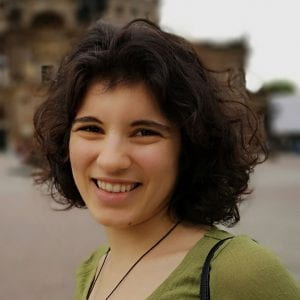Current role: Postdoctoral fellow (University of Münster, Germany)
Overview of current research project
As a postdoctoral fellow in Prof. Schulte-Merker’s group, I have set out to explore the novel molecular mechanism driving vertebral patterning and mineralization in teleost fish.
How did you find your PostDoc?
Finding my postdoc resulted from persistently looking out for opportunities within my field of interest (gene regulation and dynamics during development). Particularly during conferences, I took all chances to present my work and to approach members of the groups that interested me.
How was the transition from PhD student to PostDoc?
I experienced a relatively smooth transition from being a PhD student to being a postdoc. It was helpful that I kept working with the same model organism, therefore I already felt confident with some of the techniques and background. Furthermore, despite changing my location from the UK to Germany, I found the culture between the institutions was very similar.
What helped you be successful?
Gaining independence already as a PhD student was a major step towards a smooth transition to being a postdoc, for example when designing experimental assays and interpreting results in the context of literature. Other important attributes, best acquired during the PhD, are the abilities to persevere and to adapt quickly (for example, your experimental approach or focus, if necessary). Key for my achieving the above, and for successfully settling in my new project, was the support and mentoring of my PhD supervisor.
What aspects of the SWBio DTP programme has helped you with your career?
Being in the SWBio DTP programme aided me in developing my skill set as a developmental biologist, while at the same time studying mathematical modelling, and being able to integrate it into my work. Systems biology is an exciting field, full of opportunities, and I am very grateful to have had the chance to delve into it. In addition, the programme urged interdisciplinary networking, allowing students to learn about projects very different to their own, as well as to get input and perspective on their work from experts in other fields.
In particular, how did your PIPS placement help you with your career?
Participation in the PIPS scheme was an enlightening experience for me, as it allowed me to change environment and to form a firm opinion on which path I wanted to follow following the end of my PhD. This experience was a very positive one, as my placement was in a friendly, creative environment, and my project was one that had impact. Nevertheless, it was an important realization for me, that despite my 3 months in industry being fulfilling, academia was the right career path for me.
What is the best part of your job?
I am passionate about research. My job gives me the opportunity to be creative, in a friendly, open environment, that encourages innovative thinking. I enjoy the fact that every day is unpredictable, as new data might change your understanding of how things work or, even, perspective of your project.
What advice would you give other students wishing to follow a career in academia?
My advice would be to remain always positive and persistent, and to always keep an eye out for new developments or technologies that might prove useful. Take each opportunity to network, to form useful collaborations, and to present your work, be that in lab meetings or international conferences. Finally, don’t hesitate to go the extra mile and pick up extra projects, but without losing track of the main one and focusing on producing publication quality data.
Publications:
- Petratou, K., Spencer, S. A., Lister J., Kelsh, R. N. (2019). The MITF paralog tfec is required in neural crest development for fate specification of the iridophore lineage from a multipotent pigment cell progenitor. Manuscript in preparation.
- Petratou, K., Subkhankulova, T., Lister, J., Rocco, A., Schwetlick, H. R., Kelsh, R. N. (2018). A systems biology approach uncovers the core gene regulatory network governing iridophore fate choice from the neural crest. PLoS Genetics. 14(10):e1007402.
- Petratou, K., Camargo-Sosa, K., Al Jabri, R., Nagao, Y., Kelsh, R. N. (2017). Transcript and protein detection methodologies for neural crest research on whole mount zebrafish and medaka. Methods in Molecular Biology (pp. 167-184). Springer.
- Kelsh, R. N., Petratou, K. (2017). Gnawing at striping – how rodents evolve striped patterns. Pigment Cell & Melanoma Research. 30(2):181-182.
- Lapedriza, A., Petratou, K., & Kelsh, R. N. (2014). Neural Crest Cells and Pigmentation. Neural Crest Cells (pp. 287–311). Elsevier.

